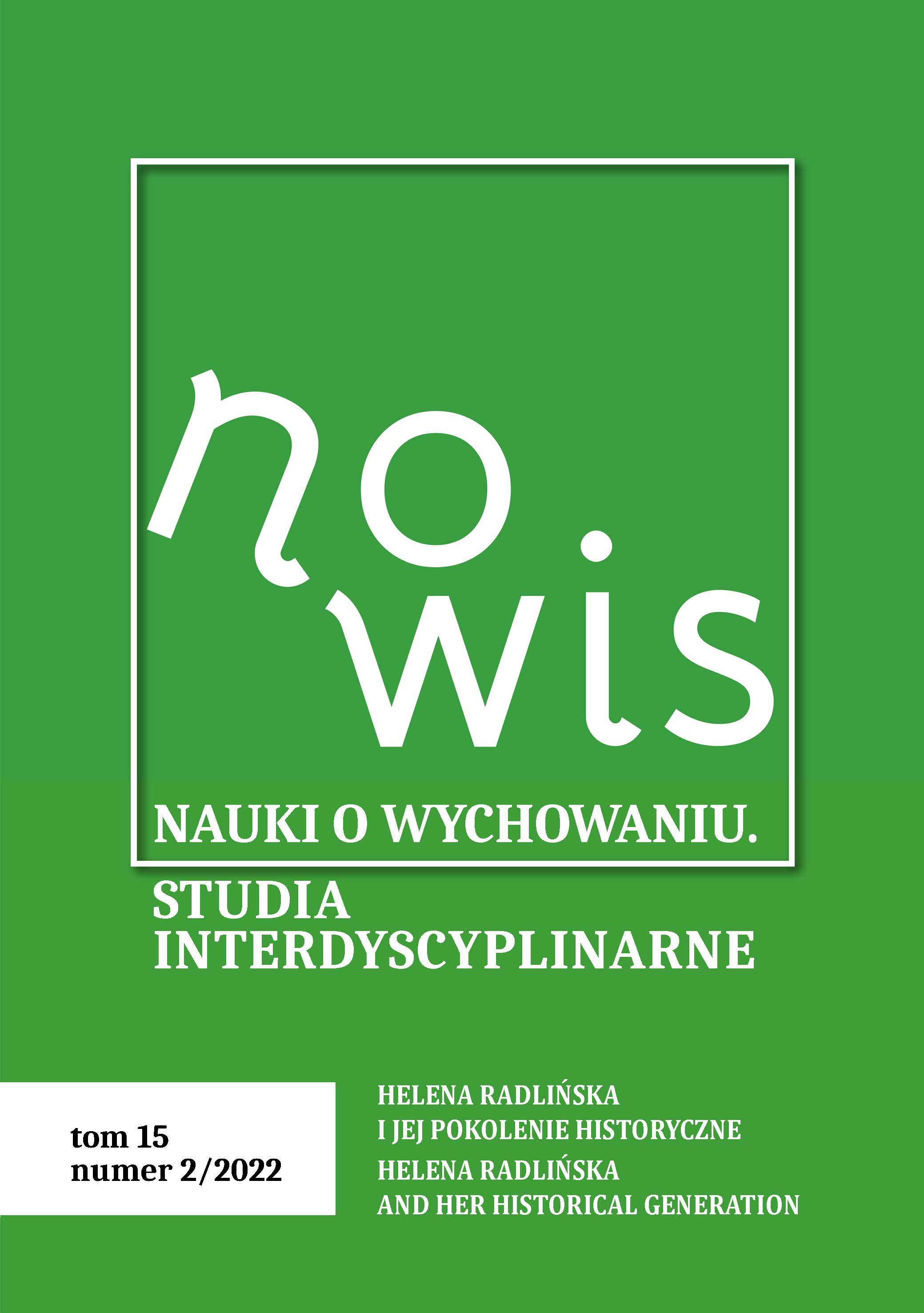Helena Radlińska’s “Invisible Environment” – the Contemporary Potential of the Category
DOI:
https://doi.org/10.18778/2450-4491.15.04Keywords:
invisible environment, the tacit dimensions of education, the complexity of education, criticism of metaphysics, symbolic culture, humanistic inspirations in educationAbstract
The article is an attempt to examine the semantic potential of the concept of the invisible environment used by Helena Radlińska. Using various concepts and tropes present in the pedagogical tradition and in contemporary humanities, the author tries to answer the question: What dimensions of experience does pedagogical thinking open to when we use the category of an invisible environment? This study was performed in the following few steps. First, the author recalls the original context of the concept located in American social work. Then he traces the semantic shifts in the use of the term invisible environment in Radlińska’s work. At the same time, he reconstructs and argumentatively strengthens the cultural and metaphysical context of this category. In the next step, he recalls the categories functioning in pedagogical literature, among others: invisibility, hiding, noiselessness. An important part of the text is the search for the concept of invisibility (and its synonyms) in contemporary humanities. It turns out that pedagogy can benefit from the clues contained in the works of Charles Taylor, Maurice Merleau-Ponty, Mikhail Bakhtin, Michael Oakeshott, Jacques Rancière, Michael Polanyi, Hans-Georg Gadamer and others. In the end, the author refers to the typology of aspects of the invisible environment by Lech Witkowski and tries to enrich it with new elements.
References
Bernstein B. (1990) Odtwarzanie kultury, tłum. Z. Bokszański, A. Piotrowski, Warszawa, Państwowy Instytut Wydawniczy.
Google Scholar
Biesta G. (2013) The Beautiful Risk of Education, Boulder–London, Paradigm Publishers.
Google Scholar
Calvino I. (1975) Niewidzialne miasta, tłum. A. Kreisberg, Warszawa, Wydawnictwo Czytelnik.
Google Scholar
Czaja D. (2021) Blask ciemnieje. Lektury hermeneutyczne, Kraków, Wydawnictwo Pasaże.
Google Scholar
Czyżewski K. (2019) W stronę Xenopolis, Kraków, Międzynarodowe Centrum Kultury.
Google Scholar
Derrida J. (2016) Widma Marksa. Stan długu, praca żałoby i nowa międzynarodówka, tłum. T. Załuski, Warszawa, Wydawnictwo Naukowe PWN.
Google Scholar
Dybel P. (2009) Okruchy psychoanalizy. Teoria Freuda między hermeneutyką i poststrukturalizmem, Kraków, Universitas.
Google Scholar
Folkierska A. (1990) Pytanie o pedagogikę, Warszawa, Wydawnictwa Uniwersytetu Warszawskiego.
Google Scholar
Franczak J. (2017) Błądzące słowa. Jacques Rancière i filozofia literatury, Warszawa, Instytut Badań Literackich PAN.
Google Scholar
DOI: https://doi.org/10.4000/books.iblpan.7972
Gadamer H.-G. (2004) Prawda i metoda. Zarys hermeneutyki filozoficznej, tłum. B. Baran, Warszawa, Wydawnictwo Naukowe PWN.
Google Scholar
Grondin J. (2021) Piękno metafizyki. Esej o filarach hermeneutycznych, tłum. M. Marczak, Warszawa, Państwowy Instytut Wydawniczy.
Google Scholar
Hurlbutt M. (1923) The invisible environment of an immigrant w: Proceedings of the National Conference of the Social Work, Chicago, Illinois, The University of Chicago Press.
Google Scholar
Kamiński A. (1961) Zakres i podstawowe pojęcia pedagogiki społecznej Heleny Radlińskiej w: Pedagogika społeczna, H. Radlińska, wstęp A. Kamiński, oprac. Wyrobkowa-Delawska, Wrocław–Warszawa–Kraków, Zakład Narodowy Imienia Ossolińskich – Wydawnictwo, s. XX–XLIV.
Google Scholar
Kołakowski L. (1999) Jeśli Boga nie ma…, tłum. T. Baszniak, M. Panufnik, Horror metaphysicus, tłum. M. Panufnik, Poznań, Zysk i S-ka Wydawnictwo.
Google Scholar
Koziołek K. (2017) Czas lektury, Katowice, Wydawnictwo Uniwersytetu Śląskiego.
Google Scholar
Kruszelnicki M. (2008) Inspiracje Heideggerowskie we współczesnym antyhumanizmie, „Forum Oświatowe”, nr 20, s. 51–63.
Google Scholar
Marynowicz-Hetka E. (2006) Pedagogika społeczna. Podręcznik akademicki, t. 1, Warszawa, Wydawnictwo Naukowe PWN.
Google Scholar
Marynowicz-Hetka E. (2019) Pedagogika społeczna. Pojmowanie aktywności w polu praktyki, Łódź, Wydawnictwo Uniwersytetu Łódzkiego.
Google Scholar
DOI: https://doi.org/10.18778/8142-557-5
Merleau-Ponty M. (1996) Widzialne i niewidzialne, tłum. J. Migasiński i in., Warszawa, Fundacja Aletheia.
Google Scholar
Mikiewicz P. (2016) Socjologia edukacji. Teorie, koncepcje, pojęcia, Warszawa, Wydawnictwo Naukowe PWN.
Google Scholar
Oakeshott M. (1999) Wieża Babael i inne eseje, tłum. A. Lipszyc, Ł. Sommer, M. Szczubiałka, Warszawa, Fundacja Aletheia.
Google Scholar
Polanyi M. (2009) The Tacit Dimension, Chicago-London, The University Of Chicago Press.
Google Scholar
Popper K.R. (1997) W poszukiwaniu lepszego świata. Wykłady i rozprawy z trzydziestu lat, tłum. A. Malinowski, Warszawa, Wydawnictwo „Książka i Wiedza”.
Google Scholar
Popper K.R. (1998) Wiedza a zagadnienie ciała i umysłu. W obronie interakcji, tłum. T. Baszniak, Warszawa, Wydawnictwo „Książka i Wiedza”.
Google Scholar
Radlińska H. (1935) Stosunek wychowawcy do środowiska społecznego. Szkice z pedagogiki społecznej, Warszawa, „Nasza Księgarnia”.
Google Scholar
Radlińska H. (1938) Książka wśród ludzi, Lwów, Państwowe Wydawnictwo Książek Szkolnych.
Google Scholar
Radlińska H. (1961) Pedagogika społeczna, wstęp A. Kamiński, oprac. Wyrobkowa-Delawska, Wrocław–Warszawa–Kraków, Zakład Narodowy Imienia Ossolińskich – Wydawnictwo.
Google Scholar
Radlińska H. (1964) Z dziejów pracy społecznej i oświatowej, Wrocław-Warszawa-Kraków, Zakład Narodowy im. Ossolińskich – Wydawnictwo.
Google Scholar
Radlińska H. (1979) Oświata i kultura wsi polskiej. Wybór pism, Warszawa, Ludowa Spółdzielnia Wydawnicza.
Google Scholar
Ricoeur P. (1989) Język, tekst, interpretacja. Wybór pism, tłum. P. Graff, K. Rosner, Warszawa, Państwowy Instytut Wydawniczy.
Google Scholar
Suchodolski B. (1928) Przebudowa podstaw nauk humanistycznych, Wrocław, Księgarnia Zakładu Narodowego im. Ossolińskich.
Google Scholar
Taylor Ch. (2001) Źródła podmiotowości. Narodziny tożsamości nowoczesnej, tłum. M. Gruszczyński i in, Warszawa, Wydawnictwo Naukowe PWN.
Google Scholar
Witkowski L. (2000) Uniwersalizm pogranicza. O semiotyce kultury Michała Bachtina w kontekście edukacji, Toruń, Wydawnictwo Adam Marszałek.
Google Scholar
Witkowski L. (2014) Niewidzialne środowisko. Pedagogika kompletna Heleny Radlińskiej jako krytyczna ekologia idei, umysłu i wychowania. O miejscu pedagogiki w przełomie dwoistości w humanistyce, Kraków, Oficyna Wydawnicza „Impuls”.
Google Scholar
Woleński J. (1985) Filozoficzna szkoła lwowsko-warszawska, Warszawa, PWN.
Google Scholar






 The journal's website, created and edited by the NOWiS Editorial Team on the Index Copernicus platform:
The journal's website, created and edited by the NOWiS Editorial Team on the Index Copernicus platform: 





